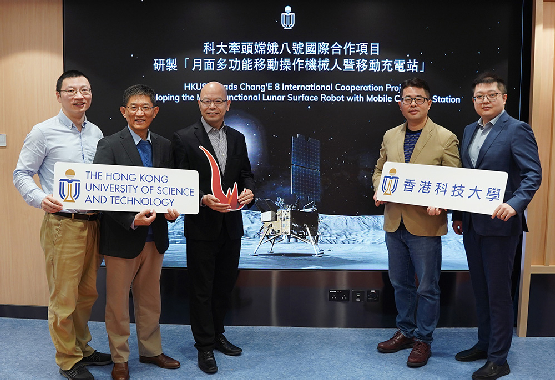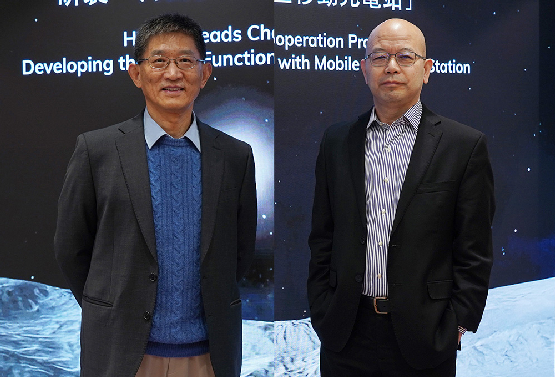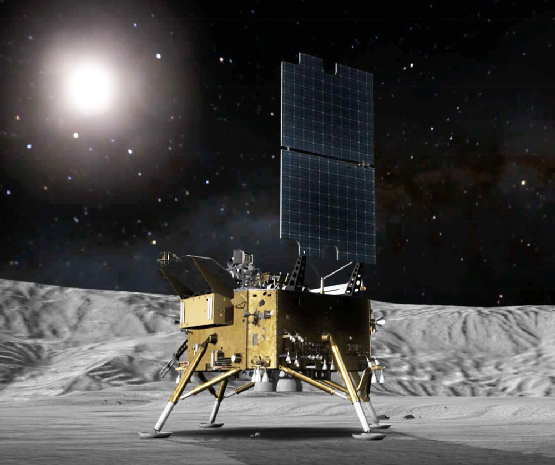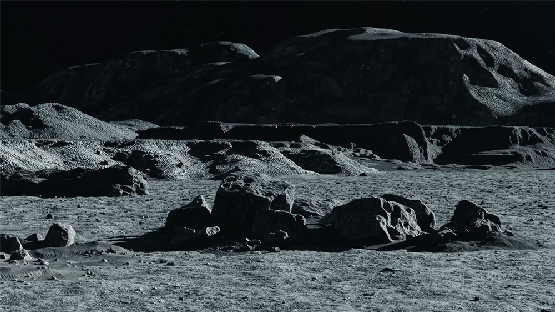



HKUST President Prof. Nancy IP stated, "We express our heartfelt gratitude to the CNSA for their trust and the unwavering support of the HKSAR government. Leading the national lunar exploration project is a significant honor, and we are excited about the opportunities ahead. Aerospace engineering is a strategic development area at HKUST. Following the triumphant launch of Hong Kong's first environmental remote sensing satellite from the higher education sector last August, we are now actively advancing the High-Resolution Global Greenhouse Gas Observatory project, which we anticipate will play a vital role in the Chinese Space Station in the near future. We are also proud to participate in the Chang'E 8 International Cooperation Project, which represents HKUST’s landmark involvement in deep space exploration. We are poised to harness our leading research capabilities in aerospace to significantly contribute to the national aerospace mission."
Expected to weigh about 100 kilograms, the robot to be developed by the Hong Kong team will conduct scientific exploration, instrument deployment and installation tasks in the Moon's harsh environment. Its mobile wireless charging capability can power up various devices on the lunar surface, boosting the efficiency of both lunar exploration and collaborative operations. Ultimately, the project will propel technology for deep space exploration and lay the groundwork for future scientific research at an international lunar research station on the Moon.
Principal Investigator, Prof. YU Hongyu from the Department of Mechanical and Aerospace Engineering (MAE) as well as Director of the HKUST Space Science and Technology Institute, outlined several significant challenges of the mission. "First, our robot venturing into the lunar south pole will encounter extremely low temperatures. To ensure its reliable performance, the use of advanced materials and temperature management systems is essential. Secondly, the absence of satellite navigation on the Moon means a smart design is required to effectively address the complexities of positioning, navigation, autonomous movement and operational control. At the same time, the robot must stay lightweight while handling multiple precision tasks and serving as a charger for other lunar equipment. By leveraging the unique strengths of each team member, we will create an innovative robot by optimizing the design with advanced materials and manufacturing techniques. The project will adhere to China's aerospace quality assurance mechanism to ensure the national mission is accomplished with flying colors."
In October 2023, CNSA issued the Opportunity Announcement for International Cooperation on the Chang’E-8 Mission. Leading the charge, HKUST assembled a team of international partners to submit a proposal to the Lunar Exploration and Aerospace Engineering Center of CNSA and was selected in November this year. To support the Chang'E 8 International Cooperation Project and bolster local aerospace technology capabilities, the Innovation, Technology and Industry Bureau of HKSAR government funded the establishment of Hong Kong's first space-focused InnoHK research center through ITC. Leading the center are MAE Prof. SUN Qingping as director and Prof. Yu Hongyu as co-director, with Prof. WU Bo, Associate Head of the Department of Land Surveying and Geo-Informatics at PolyU, as the deputy director.
Center Director Prof. Sun emphasized, “This initiative marks a historic leap in Hong Kong's history and stands as the largest endeavor of its kind. The fact that the InnoHK Center is entrusted with the mission to lead a joint team comprising experts from local universities, mainland institutions, and international space agencies, is a testament to the nation’s recognition of HKUST and the Hong Kong aerospace team’s capabilities in cutting-edge fields such as mechanical, aerospace, electronics, heat transfer, and materials engineering. We will seize this opportunity and bring this mission to fruition by leveraging the strong research foundation of Hong Kong’s higher education sector as well as the city’s advantages as a global innovation and technology hub. We shall integrate fundamental research and scientific innovation with real-world engineering applications, foster interdisciplinary collaboration, and contribute to the nation’s aerospace efforts on behalf of Hong Kong.”
The key research personnel involved in the project include Prof. SHI Ling and Prof. DUAN Molong from HKUST; Prof. TAO Xiaoming and Prof. XU Bingang from PolyU; Prof. LIU Tao from HKU; Prof. ZHANG Weizhao from CUHK; Prof. GAO Siyang from CityU; Chief Research Engineers ZHANG Yuhua and ZHANG Chongfeng from SAST; Prof. YU Xiaozhou from DUT; Prof. ZHU Ping from SZU; and Dr. Martin SNOW from the SANSA.
About The Hong Kong University of Science and Technology
The Hong Kong University of Science and Technology (HKUST) (https://hkust.edu.hk/) is a world-class university committed to innovative education, research excellence, and impactful knowledge transfer. Our holistic and interdisciplinary pedagogy approach is recognized globally. HKUST placed 3rd in the Times Higher Education’s Young University Rankings 2024, 19th Worldwide and No.1 in Hong Kong in Times Higher Education’s impact Rankings. Twelve of HKUST’s subjects were ranked among the world’s top 50 in the QS World University Rankings by Subject 2024. Of these, "Data Science and Artificial Intelligence" ranked first in Hong Kong and 10th in the world. Our graduates are highly competitive, consistently placing among the world’s top 30 most sought-after employees. Our research and entrepreneurship endeavors are also innovative and impactful. Over 80% of our work was rated “Internationally excellent” or “world leading” in the latest Research Assessment Exercise 2020 of Hong Kong’s University Grants Committee. As of October 2024, HKUST members have founded 1,800 active start-ups, including 10 Unicorns and 14 exits (IPO or M&A).





|
HKUST Introduces City’s Largest Liquid Immersion Cooling Technology for Sustainable AI & Scientific Research
|
|
HKUST Develops Groundbreaking Artificial Compound Eye to Revolutionize Robotic Vision at Lower Cost but Higher Sensitivity
Enhancing Autonomous Driving and Emergency Rescue
|
|
HKUST Develops World’s Smallest Multifunctional Biomedical Robot for Interventional Diagnosis and Treatment
|